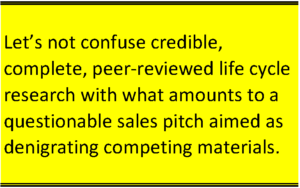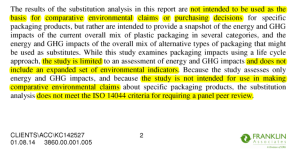The plastics industry is besieged on multiple fronts and widely depicted as the “archetypical eco-villain of the modern world,” according to the editor of Canadian Packaging magazine. He then latches onto an American Chemical Council study that purports to show how much worse the world would be environmentally if plastics were replaced by competing materials such as paper, glass and metal.
Whatever we say on this subject is bound to be construed by certain parties as biased and confrontational since we compete with our plastic colleagues on many fronts. The reality, however, is that

many of our members have a foot in both camps, producing both paper and plastic packaging, the better to serve their customer base. And it’s not as if we, as paper, do not have some empathy for the current disrepute the plastics industry generally finds itself in. Remember the “forest wars” of the 1980s and 1990s and the dioxin threat? Paper was a dirty word.
What we do find difficult to digest, however, is the editor’s uncritical support for, and fulsome quotation from, the particular report he cites. This study, sponsored by the plastics industry, is far from being as “scientifically and empirically sound” as he claims. For starters, it looks only at two (just two) life cycle components (energy consumption and greenhouse gas emissions). You won’t find anything here about air pollution, the sustainability of exploiting non-renewable oil and natural gas deposits, or the impact of plastic litter on marine life. So the study is not a complete life cycle analysis, it’s a partial one.
The authors acknowledge this. The study “does not include an expanded set of environmental indicators.” Nor does it “meet the ISO 14044 criteria for requiring a panel peer review.” Its conclusions, the authors add, are “not intended to be used as the basis for comparative environmental claims or purchasing decisions.”
So why are they being used publically for that very purpose? And why is Canadian Packaging repeating them unquestioningly as if to prove that plastics ain’t that bad? Plastics have their place. And some good things come in plastic. But let’s not confuse credible, complete, peer-reviewed life cycle research with what amounts to a questionable sales pitch aimed at denigrating competing materials.

Authors of this report acknowledge its limitations
